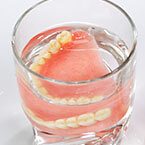Eating and Speaking with Dentures

Table of Contents
How Dentures Look and Feel
New wearers often report a “full-mouth” feeling, as though the dentures are too big and pushing the lips forward. This feeling will diminish as you adjust to wearing dentures. They may feel like they don’t fit properly at first. They may “gag” you or cause you to bite your cheek or tongue. If you wear an upper denture, it may take some time for your tongue to get used to the feeling of being pressed against the denture and not your palate. Don’t worry. These problems will decrease over time.
New Sensations with Dentures
Because a denture is a “foreign object” in the mouth, you may produce more saliva for a while. This, too, will decrease and eventually go away. Something as simple as sucking on a mint or hard candy will encourage you to swallow more frequently, clearing excess saliva. Some soreness is also expected, usually within a few hours of putting your dentures in your mouth. To help relieve some of that soreness and denture irritation trying rinsing with Oral-B Mouth Sore Special Care. If it continues, see a dental professional; never try to make adjustments to your dentures yourself.
It's also important to take care of your gums while wearing dentures. Consider massaging your gums with an Oral-B iO electric toothbrush, it includes a gum care mode to help stimulate and protect your gumline.
Eating with Dentures for the First Time
Dentures take some getting used to, but with a few simple strategies up your sleeve, you can feel confident all day long. As a new denture wearer, you may find that chewing feels different with dentures. You also may think that food has "lost its flavor." While you are adjusting to wearing your dentures, your mind is receiving strong signals from your mouth about your dentures, which overpower the messages from your taste buds. After you are accustomed to the denture, your mind will pay less attention to your dentures and more to your taste buds.
During your adjustment time, you may have trouble sensing hot foods and drinks, which is common with new denture wearers. Be careful; you don't want to burn your mouth.
Tips for Eating with Dentures
To eat more easily and enjoyably while wearing dentures:
- Begin with small quantities of food cut into smaller pieces.
- Chew half of the food in your mouth on the back-left side of your mouth and the other half on the back-right side. This will even out the pressure on your dentures.
- Start with soft foods. Some good examples are eggs, fish, chopped meat, cooked vegetables, and puddings. After you feel more confident, try eating chewier foods, such as steak or celery.
Speaking with Dentures
When you speak, the sound reaches your ears through vibrations in the bones of the jaw and skull. Wearing dentures changes and increases the sound, but this is much more noticeable to you than to anyone else.
If your dentures "click" when you speak, try to speak more slowly to avoid movements that raise and/or move your lower denture. Keeping your lower denture in place requires the ability to hold it still with the muscles of your lips, cheeks, and tongue. At first, these muscles may tend to "kick out" your denture. With time and practice, you will be able to overcome the difficulties of speaking.
Tips for Speaking with Dentures
To speak more confidently while wearing your dentures:
- Use a denture adhesive. Using a denture adhesive will help secure your dentures and make it easier to speak clearly.
- Bite and swallow before speaking. This places your dentures in position so you can speak more clearly.
- Practice reading aloud.
For more about dentures visit dentureliving.com
Table of Contents
- How Dentures Look and Feel
- New Sensations with Dentures
- Eating with Dentures for the First Time
- Tips for Eating with Dentures
- Speaking with Dentures
- Tips for Speaking with Dentures
-
- Related Articles

Sign Up
for expert advice and exclusive offers

Sign Up
for expert advice and exclusive offers





